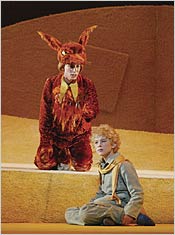
Since its premiere in Houston in May 2003, Rachel Portman’s operatic version of Antoine de Saint-Exupéry’s classic kiddie fable The Little Prince has traveled far and seems to be a great hit. Most recently, a faithful replica of the original production arrived at the City Opera, directed by Francesca Zambello and designed by the late Maria Bjørnson. I caught two matinee performances, both received with apparent delight by busloads of children, many of whom were probably seeing their very first opera.
Well, I hated it, and I wouldn’t be surprised if a lot of the kids secretly did, too. Adults are often all too ready to insult the intelligence of a bright child, and I will be eternally grateful to my parents for starting my opera-going with red meat like Tosca, saving Hänsel und Gretel for later on, when I could really appreciate that sophisticated score. The Little Prince’s indignities begin with Nicholas Wright’s libretto, cast in jingly rhyming couplets so banal that even a 6-year-old could probably write out the second line after hearing the first. Portman’s sugary score is a perfect match for such doggerel. All the Little Prince’s adventures with his friend the Pilot—encounters with a quartet of nutty hunters, a sleazy snake, dancing baobab trees, a thoughtful fox, a singing pail of water, etc.—are cut from the same innocuous, pretty-pretty fabric in which one irritating singsong pattern fits all. Any one of Portman’s many film scores (she got an Oscar for Emma) is more musically inventive than this pap.
It’s odd that the opera turns out to be so feeble, considering that Portman is from England, where composers have developed a rich repertory of effective operas that aim to please children without condescending to them. Benjamin Britten’s Noye’s Fludde and The Little Sweep are prime examples, operas with an edgy originality that, for all their modest materials, not only entertain youngsters but also provide them with singing and instrumental parts that challenge but never overwhelm. Almost as enjoyably provocative are Malcolm Williamson’s The Happy Prince (after Oscar Wilde) and Julius Caesar Jones, not to mention Oliver Knussen’s sly setting of another children’s classic, Maurice Sendak’s Where the Wild Things Are. And any composer who embarks on an opera for young people should note and try to emulate the magical childlike spirit of Ravel’s L’Enfant et les Sortilèges, the one true masterpiece of the genre.
I will be very surprised if Portman’s pallid Little Prince enjoys much shelf life after this first flurry of interest. Perhaps the best aspect of the current production is Zambello’s refined stage direction and Bjørnson’s witty sets, which take us from the sandy Sahara, where both the Pilot and the Little Prince crash-land, to a subliminal vision of the Prince’s home, a tiny house-size planet floating somewhere in space. Despite an alarming resemblance to one of those cute little monsters who takes over the world in Village of the Damned, young Graham Phillips’s scampering Little Prince is a delight, while Keith Phares gives him firm and friendly support as the Pilot.
The Little Prince
Rachel Portman.
New York City Opera.